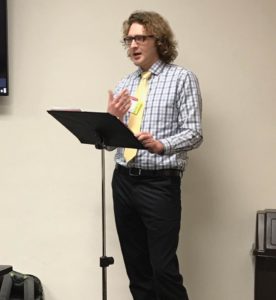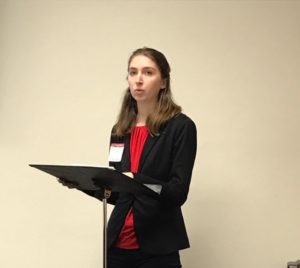 This month I was able to go to the 40th Appalachian Studies Association Conference. I attended panels on food growth, just economic transition, combating white supremacy in the region, and the book Hillbilly Elegy. The talks were engaging and even personal as was the case for Hillbilly Elegy, wherein the author shares a somewhat simplified view of my hometown of Jackson, Ky. There were sometimes as many as 25 concurrent sessions, attesting to the wide range of study being done within Appalachia.
This month I was able to go to the 40th Appalachian Studies Association Conference. I attended panels on food growth, just economic transition, combating white supremacy in the region, and the book Hillbilly Elegy. The talks were engaging and even personal as was the case for Hillbilly Elegy, wherein the author shares a somewhat simplified view of my hometown of Jackson, Ky. There were sometimes as many as 25 concurrent sessions, attesting to the wide range of study being done within Appalachia.
While there, I was able to present with fellow Berea College students Emily Masters and Robert Renner in a student panel on gender and violence in Appalachia. I was speaking on a sculpture project I had done last year that  consisted of almost 900 cornhusk dolls and spoke to atrocities done to women in coal camps. I was nervous, speaking on such a difficult topic and being new to the world of academic conferences. This was a first for me, as I had never presented at a conference before. Considering the number of
consisted of almost 900 cornhusk dolls and spoke to atrocities done to women in coal camps. I was nervous, speaking on such a difficult topic and being new to the world of academic conferences. This was a first for me, as I had never presented at a conference before. Considering the number of
concurrent sessions and the smaller sized room we were assigned for our panel, I was initially worried that no one would come to our talk. However, as one o’clock rolled around listeners filled the seats until there were none left, and we were able to present to 25 or so people. I was a nervous wreck at the time, hands and voice shaking as I read my prepared statements that I had practiced a number of times. As the talk went on my nerves soothed and I found more resolve in myself to share the project. Few people stayed on past the end of the panel to talk, but the day after several people came to me and said, “I’ve been telling everyone about your talk.”
 I heard and read of many exciting ventures in the region: oral history capturing projects, new restaurants, gardening initiatives, university involvements in communities, and of multiple publishers exploring regional topics. This was proof to me that Appalachia is not a dying culture, but is experiencing a kind of renaissance behind the scenes. While there is no shortage of things to be pessimistic about nationally and regionally, the number of people I saw there who passionately care about the mountains and peoples of Appalachia gave me reason to believe that things will improve.
I heard and read of many exciting ventures in the region: oral history capturing projects, new restaurants, gardening initiatives, university involvements in communities, and of multiple publishers exploring regional topics. This was proof to me that Appalachia is not a dying culture, but is experiencing a kind of renaissance behind the scenes. While there is no shortage of things to be pessimistic about nationally and regionally, the number of people I saw there who passionately care about the mountains and peoples of Appalachia gave me reason to believe that things will improve.
Article Written by Jackson Napier